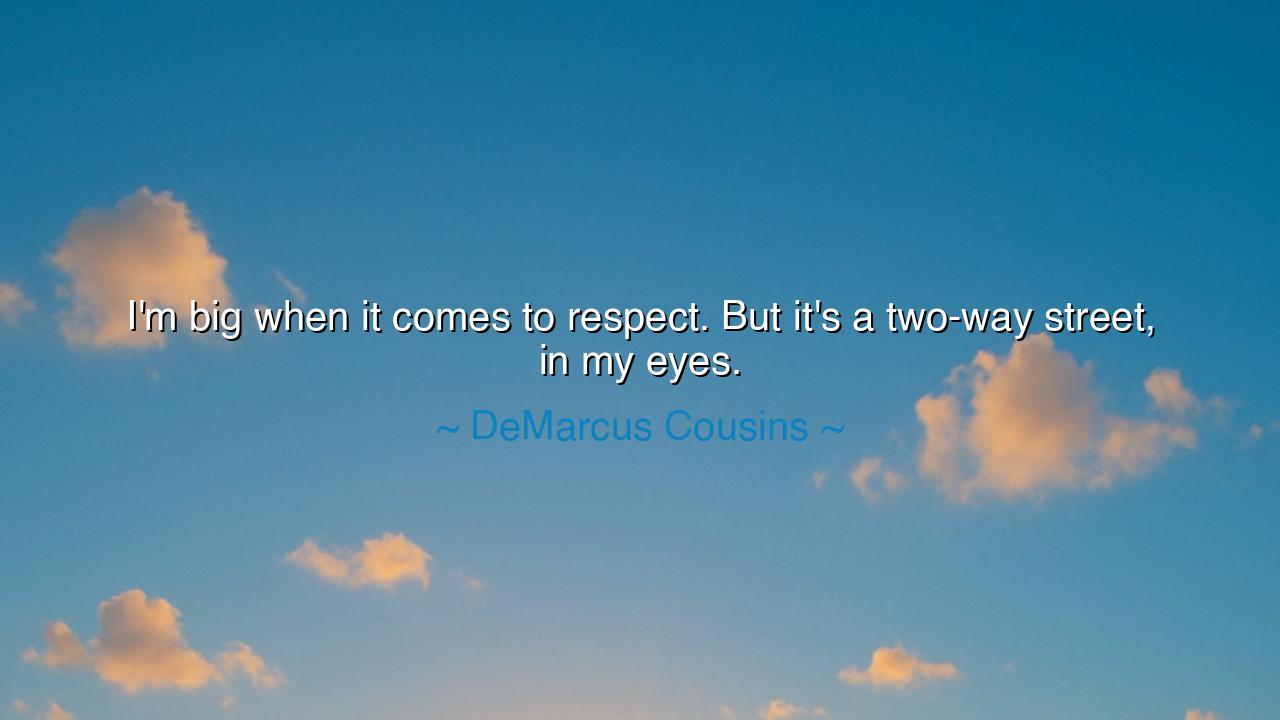
I'm big when it comes to respect. But it's a two-way street, in






Hear, O seekers of balance and dignity, the words of the warrior of the court, DeMarcus Cousins, who declared: “I’m big when it comes to respect. But it’s a two-way street, in my eyes.” These words come not merely from the lips of an athlete, but from the heart of a man who has fought for his place, endured misunderstanding, and demanded fairness in a world that often forgets reciprocity. They ring as a reminder that respect is not a gift to be given lightly, nor a burden to be borne alone—it is a covenant, binding two souls, two communities, two peoples together in shared regard.
The origin of this saying lies in the arena of professional basketball, where tempers run high, egos clash, and the weight of fame often distorts the truth of character. Cousins, known for his fiery spirit and unyielding presence, was often painted by the media as unruly or defiant. Yet in his own words, he makes clear his code: that his passion is rooted not in arrogance, but in the demand for mutual respect. He would honor those who honored him, but he would not bow before those who scorned him. In this, his voice reflects the timeless struggle of all who insist that dignity must flow both ways.
To say that respect is a two-way street is to reject the chains of one-sided submission. It is to affirm that no man or woman should be compelled to honor those who trample them, nor to remain silent in the face of contempt. Respect, Cousins teaches, is a bridge, and a bridge must be built from both sides. Without reciprocity, there is no trust, no peace, no harmony—only domination on one end and bitterness on the other.
History itself shines with such lessons. Consider the tale of Frederick Douglass, the enslaved man who rose to greatness, who declared that he would not accept kindness at the cost of his dignity. In demanding respect, he forced even his oppressors to reckon with his humanity. Or recall the dealings of George Washington with his soldiers: though their commander, he never treated them as lesser men, but shared their hardships, honored their courage, and in so doing won their undying loyalty. Respect freely given and reciprocated becomes the foundation of strength.
The deeper meaning of Cousins’ words is this: respect cannot be demanded without being offered, nor can it be offered where there is no justice. Many seek power without regard for fairness, but power is hollow when it does not rest upon respect. True greatness—whether on the court, in the halls of politics, or in the daily dealings of life—emerges only when people look one another in the eye and see an equal worthy of regard.
The lesson is clear: in your own life, do not shrink from demanding respect, but be sure to give it also. Honor those around you, regardless of station, and treat them as you wish to be treated. Do not confuse fear with respect, nor silence with honor. Build relationships as one builds roads—by paving both directions, ensuring that trust and dignity travel freely between hearts.
Therefore, O listeners, let your practice be this: in family, in friendship, in labor, and in struggle, hold firm to the truth that respect is a shared covenant. Offer it generously, demand it bravely, and withdraw it only when it is profaned. In so doing, you will stand not only as an individual of honor, but as a builder of harmony in a world too often torn apart by contempt.
Thus let Cousins’ words endure: “I’m big when it comes to respect. But it’s a two-way street, in my eyes.” For in them lies a creed worthy of kings and commoners alike: respect given, respect received, and in that exchange, the true measure of humanity.






AAdministratorAdministrator
Welcome, honored guests. Please leave a comment, we will respond soon